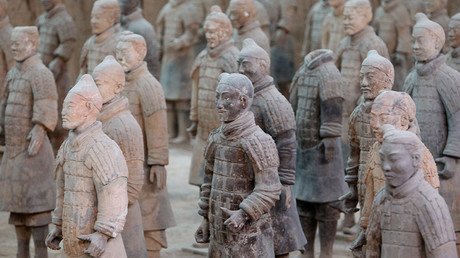Major archeological discovery made in China
Chinese archaeologists say that they’ve unearthed some 220 more terracotta warriors near Emperor Qin Shi Huang’s Mausoleum in Shaanxi Province in the northwestern part of the country.
Some 16 terracotta horses, four chariots, weapons, and production tools have also been dug up, the Xinhua news agency reported on Thursday, citing the province’s Relics Management Bureau.
The findings were made during an excavation at the largest burial pit outside the mausoleum, Pit No.1, which spans 14,260 square meters.
Archeologists have made several other major breakthroughs recently, Shen Maosheng, a researcher at the Emperor Qin Shi Huang’s Mausoleum Site Museum, told Xinhua.
The scientists have been able to determine the formation in which the figures were placed into the ground, he said.
He added that researchers have also managed to ascertain how the terracotta sculptures were made, according to Shen. The carvings on the bodies of the warriors were done first, while the arms were attached afterwards.
The Terracotta Army is a massive collection of full-sized clay-based sculptures depicting the armies of China’s first emperor, Qin Shi Huang.
They were buried in the ground around his mausoleum in 210–209 BCE with the aim of protecting the ruler in the afterlife. The discovery of the figures became a sensation in 1974. Excavation at the site has been ongoing since then. The underground army is estimated to number over 8,000 soldiers.
You can share this story on social media:








Comments are closed.